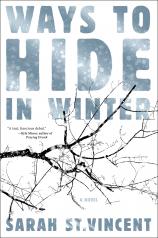Ways to Hide in Winter
Review
Ways to Hide in Winter
Kathleen is still only in her 20s, but she feels like an old woman most of the time. Ever since her husband’s death in a car accident that also left her deeply wounded (and addicted to the opioids she used to manage her chronic pain), she spends most of her days alone, moving as little as possible and keeping to herself. Kathleen works at a small convenience store in a state park near Carlisle, Pennsylvania, serving up ice cream and hamburgers to hunters and hikers on the Appalachian Trail, which runs nearby. She has had a falling-out with her parents and lives with her grandmother, a bitter woman whose progressing emphysema has failed to convince her to quit smoking.
Kathleen is lonely, but she doesn’t seem to mind; she has one good friend --- a military wife who struggles with loneliness and abandoned ambitions --- and spends much of her time reading and avoiding thoughts of the past. But a mysterious stranger who arrives at the store reluctantly pulls Kathleen out of her torpor and prompts her to refresh those uncomfortable memories.
"WAYS TO HIDE IN WINTER is one of those novels that should be discussed among readers, as its stark juxtaposition of political and domestic violence offers so much space for catharsis and debate alike."
The stranger, whose name is Daniil, is a Russian who has spent his adult life in Uzbekistan. He is cagey about what brought him to this remote part of Pennsylvania or when he intends to leave. What’s clear, though, is that whatever plans were in place to pick him up have fallen through, since he essentially has been abandoned with no money, few supplies and almost no resources to make it through the coldest part of the winter.
Kathleen sets Daniil up with a room at a nearby hostel, also located within the park. As the winter progresses, the two begin to find common ground through their shared interest in books and chess. But when officials start poking around asking questions, Kathleen is compelled to ask more specific questions about Daniil’s complicated past; likewise, what she learns about him dredges up her own painful memories.
When Kathleen first meets Daniil, she’s reading Dostoevsky’s CRIME AND PUNISHMENT. Their discussion of the moral ambiguities of that book set the stage for the complex ethical questions at the heart of the rest of the novel. Readers will grapple along with Kathleen as she contemplates how cruelty can coexist with kindness, why family would choose to turn their backs on one another, and when it’s permissible to offer grace and forgiveness --- and when it’s not.
Sarah St.Vincent, who comes from a background in human rights law enforcement and advocacy, skillfully interweaves these issues into her novel. She successfully shines a light on the horrific violence that is often perpetuated in the most secret places --- from hidden POW camps to underground prisons to the private homes of ordinary Americans. Although the book exposes the absolute worst of human nature, it also offers glimpses of redemption and forgiveness, especially in the relationship of the hostel owner to his new tenant and to Kathleen.
WAYS TO HIDE IN WINTER is one of those novels that should be discussed among readers, as its stark juxtaposition of political and domestic violence offers so much space for catharsis and debate alike.
Reviewed by Norah Piehl on November 9, 2018




